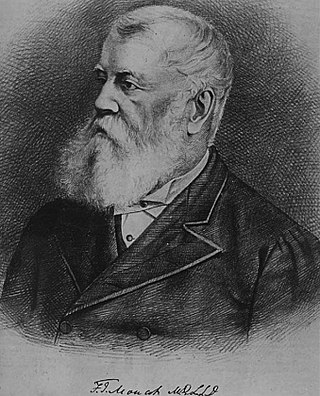The LaGrand case was a legal action heard before the International Court of Justice (ICJ) which concerned the Vienna Convention on Consular Relations. In the case, the ICJ ruled that its own temporary court orders were legally binding and that the rights contained in the convention could not be denied by the application of domestic legal procedures.

The 1888 United States presidential election was the 26th quadrennial presidential election, held on Tuesday, November 6, 1888. Republican nominee Benjamin Harrison, a former U.S. senator from Indiana, defeated incumbent Democratic President Grover Cleveland of New York. It was the third of five U.S. presidential elections in which the winner did not win the national popular vote, which would not occur again until the 2000 US presidential election.
Continental Paper Bag Co. v. Eastern Paper Bag Co., 210 U.S. 405 (1908), was a case in which the Supreme Court of the United States established the principle that patent holders have no obligation to use their patent.
New Negro Alliance v. Sanitary Grocery Co., 303 U.S. 552 (1938), was a landmark decision of the US Supreme Court which affects US labor law, safeguarding a right to boycott and in the struggle by African Americans against discriminatory hiring practices. Sanitary Grocery Co. was at the time of the case owned by Safeway Inc.
Lovell v. City of Griffin, 303 U.S. 444 (1938), is a United States Supreme Court case. This case was remarkable in its discussion of the requirement of persons to seek government sanction to distribute religious material. In this particular case, the Supreme Court ruled it was not constitutional for a city to require such sanction.
Kidd v. Pearson, 128 U.S. 1 (1888), was a case in which the Supreme Court of the United States held that a distinction between manufacturing and commerce meant that an Iowa law that prohibited the manufacture of alcohol was constitutional as it did not conflict with the power of the US Congress to regulate interstate commerce.
LabCorp v. Metabolite, Inc., 548 U.S. 124 (2006), is the first case since Diamond v. Chakrabarty in which the U.S. Supreme Court indicated a renewed interest in examining the limits of patentable subject matter for advances in life sciences. Although the Court initially agreed to hear the case, it was later dismissed in 2006 with three Justices dissenting. The defendant's petition to the Supreme Court raised an issue not addressed in opinions from the lower courts: the claim at issue was directed to patent ineligible subject matter and therefore invalid.

Rauchtown Run, named Rauchtown Creek on United States Geological Survey maps, is a tributary of the West Branch Susquehanna River in Clinton and Lycoming Counties, Pennsylvania, in the United States.
Hale v. Kentucky, 303 U.S. 613 (1938), was a United States Supreme Court case relating to racial discrimination in the selection of juries for criminal trials. The case overturned the conviction of an African American man accused of murder because the lower court of Kentucky had systematically excluded African Americans from serving on the jury in the case. NAACP counsel, including Charles H. Houston, Leon A. Ransom and Thurgood Marshall, represented Hale.

Frederic John Mouat was a British surgeon, chemist and prison reformer. He was part of the committee that helped identify the Andaman Islands as a suitable location for a convict settlement. He examined the use of chaulmogra oil in the treatment of leprosy and published the first illustrated book on human anatomy in Urdu in 1849. He was also involved in the founding of Presidency College, Calcutta.
KOOS is a radio station in North Bend, Oregon, United States. The station is owned by Bicoastal Media. KOOS airs a hot adult contemporary music format.
United States v. Smith could refer to:
The Plant Variety Protection Act of 1970 (PVPA), 7 U.S.C. §§ 2321-2582, is an intellectual property statute in the United States. The PVPA gives breeders up to 25 years of exclusive control over new, distinct, uniform, and stable sexually reproduced or tuber propagated plant varieties. A major expression of plant breeders' rights in the United States, the PVPA grants protection similar to that available through patents, but these legal schemes differ in critical respects. The PVPA should not be confused with plant patents, which are limited to asexually reproduced plants.
Chae Chan Ping v. United States, 130 U.S. 581 (1889), better known as the Chinese Exclusion Case, was a case decided by the US Supreme Court on May 13, 1889, that challenged the Scott Act of 1888, an addendum to the Chinese Exclusion Act of 1882.

Bruce Mouat is a Scottish curler. He is the reigning Scottish, European and World men's champion skip. He is also an Olympic silver medallist, having skipped Great Britain to a second place finish in the men's team event at the 2022 Winter Olympics.
Thornton v. Schreiber, 124 U.S. 612 (1888), was a United States Supreme Court case in which the Court held a copyright holder may not personally sue an employee of a business for copyright infringement if the employee was holding the infringing material on the order of their employer.
Lehman v. City of Shaker Heights, 418 U.S. 298 (1974), was a case in which the United States Supreme Court upheld a city's ban on political advertising within its public transportation system. The Court ruled that ad space on public transit is not a "public forum", meaning that speech within this space receives lower First Amendment protections.
United States v. Mouat, 124 U.S. 525 (1888), was a decision of the United States Supreme Court concerning the Appointments Clause.




